Found 35 results for Prayer
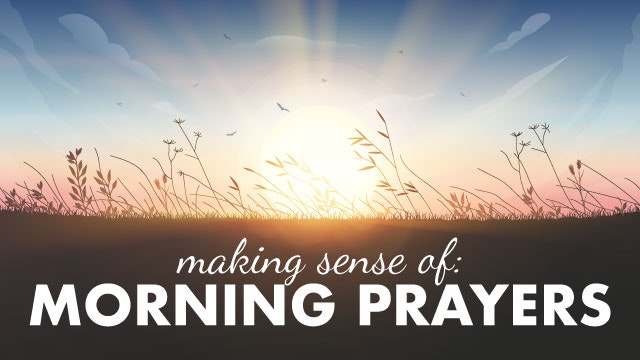
From Prayer to Creation
↳ part 2 of 6 of the series "Making Sense of: Morning Prayers"
The first blessing of the morning shema is a beautiful, poetic prayer about… light and creation. What do these themes have to do with shema or shacharit? And what might they be trying to tell us about prayer in general? In this video, Rabbi Fohrman digs deeper into the curious reference to creation in the first blessing of the morning shema. Following the hint back to its source, he offers a close reading of the biblical story of the Six Days of Creation. With morning on his mind, a surprising pattern emerges: Each day of creation is described using the same formula: “And it was evening, and it was morning...” What is the significance of this formula? And can unpacking the role of morning in the creation story help us understand the value of praying in the morning each and every day? This video is based on content that originated from part 2 of a 3 part lecture series on A Tale of God's Two Names. For a more in depth understanding of these materials, be sure to listen to A Tale of Two Names: Elokim and YHVH, A Tale of Two Names: Why Were There Days of Creation? and A Tale of Two Names: From The Garden To The Flood.

Tefillah: How Can I Pray Right Now? Like This?
What Chanah Teaches Us About How To Pray For Aleph Beta prayer videos, click here. If you’re quarantined, click here for a free Aleph Beta account. To subscribe to Aleph Beta Quarantined in your podcast app, click <a href="https://feeds.buzzsprout.com/928261.rss">here</a>, or add this link: https://feeds.buzzsprout.com/928261.rss You’re listening to the newest episode in our podcast, Aleph Beta Quarantined. To catch up on earlier episodes, click here. Coronavirus is affecting our prayers. It’s affecting where we pray and with whom. Many of us are used to experiencing prayer as something communal, something we do in shul or synagogue. Now we do it alone, in our homes. It’s also affecting the urgency of our prayers. Our thoughts and hearts are full of concern for those who are sick, those caring for the sick, and those who may get ill. Many people who are used to including one or two names of sick people in their prayers are now including lists full of names. Still others are finding it hard to pray right now at all. How do we find the words to reach out to God in the midst of all this suffering and confusion? In this episode, Imu speaks to prayer “expert” Rabbi Ami Silver about how to rethink prayer in the age of coronavirus. Aleph Beta is doing everything we can to be here for you through these difficult times. If you believe in what we’re doing, it would mean the world to have your support. Please consider <a href="https://www.alephbeta.org/subscribe">upgrading your account</a> or joining our <a href="https://www.alephbeta.org/producers-circle">Producers Circle</a>. Of course, if a donation isn’t something you can do right now, don’t think twice about it. The most important thing is for all of us to stay connected and keep our community strong.
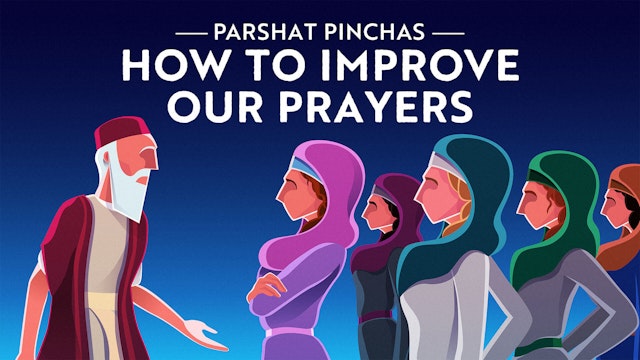
How To Improve Our Prayers
Do you know the best way to ask God for what you want? The secret to successful supplication? Let us introduce you to some people who do. In Parshat Pinchas, the five daughters of Zelophehad ask God for a plot of land in Israel. And unlike so many other times in the Book of Numbers, God says yes – without any hint of anger or reservations. Why? What made their request so great? It turns out that if we read the story carefully, it points us to another time God gave a hearty and surprising yes – and when we put these two stories together, they give us a crucial insight into what requests of God are supposed to look like. Learn all about it here. Click here to go to our "Jewish Prayer" page.

What Are Selichot: Meaning, Prayer & Service
Have you ever felt the Selichot prayer service difficult to connect to? Join Rabbi Fohrman as he dives into the Biblical texts and examines more closely the themes that permeate the Selichot prayers. Connect more deeply to these complex prayers, and enter the High Holiday period with new understanding. This video is a recording of a live event, held August 28th, 2021. For more on Selichot, join Rabbi Fohrman and the Aleph Beta scholars in Selichot Demystified.
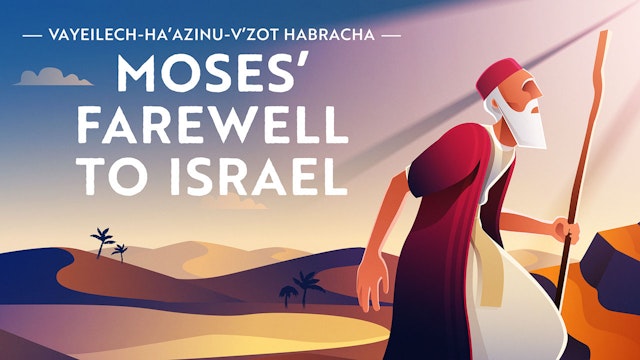
Moses’ Farewell To Israel: Part III
↳ part 3 of 3 of the series "Moses’s Psalm: A Paradigm Of God Answering Prayer"
In this week's parsha video, Rabbi Fohrman uses Psalm 90 to ask an incredibly difficult question: are we, through our prayers, able to convince God to change the course of history? To do this, we go through the verses of Psalm 90 and relate them to our own lives and human history. Rabbi Fohrman unpacks the hidden meaning of Moshe’s farewell speech to the Israelites. Tying together sections from the Psalms and the Song of the Sea, he shows that Moshe’s prayer after the sin of the Golden Calf accomplished much more than convincing God to spare the Israelites. He caused God to change the very course of history. Rather than building His own Temple, God would join forces with the Children of Israel and bring holiness to the world in partnership with them. This mind-blowing course will change the way you understand prayer, Moshe’s lasting legacy, and the depth of changing our partnership with God.
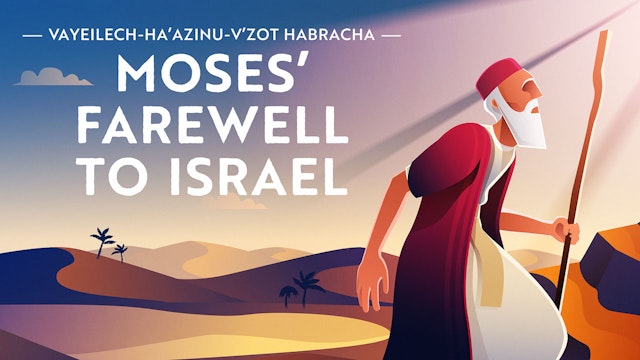
Moses' Farewell To Israel: Part I
↳ part 1 of 3 of the series "Moses’s Psalm: A Paradigm Of God Answering Prayer"
How did Moses feel when approaching the land of Israel, knowing he wouldn’t be entering the land with his people? This video is the first in a series of three, concluding the yearly Torah cycle, where we will attempt to get inside the head of Moses at the end of his journey as the leader of the Israelites.
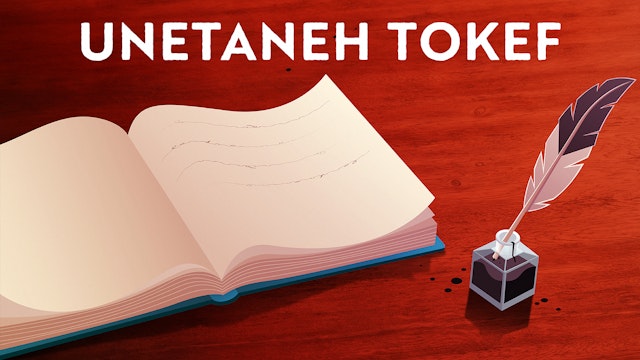
Unetaneh Tokef: Text, Interpretation & Meaning
At the center of the Rosh Hashanah and Yom Kippur prayer services is the passage "Unetaneh Tokef," literally, “let us speak of the awesomeness.” The powerful and dramatic prayer borrows imagery from the story of Elijah on Mt. Carmel. A closer look at this biblical story sheds light on God's relationship with His people, a relationship of justice and mercy. Join Rabbi Fohrman as he helps us understand the prayer of "Unetaneh Tokef" in a deeper way. Discover other great videos for the High Holidays at Aleph Beta, including ‘How To Do Teshuva”, “What Is The Meaning and Purpose of Yom Kippur” and The 13 Attributes of God.”
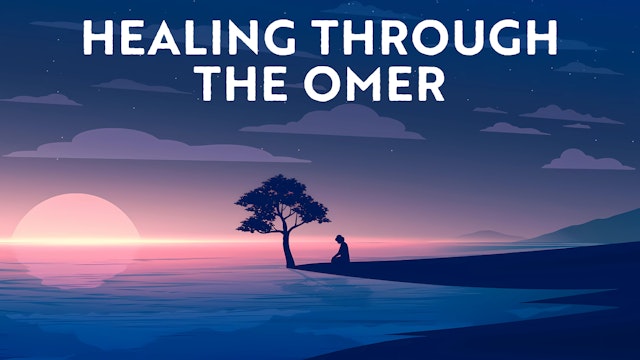
The Real Bitterness of the Bitter Waters
↳ part 3 of 8 of the series "Sefirah, Prayer and Healing from Trauma"
Join Rabbi Fohrman and Immanuel Shalev, as they dive deep into Refa’einu, our daily prayer for health, and its unexpected connections to Sefirat HaOmer. Could understanding this strange connection somehow uncover the key to relating to God as our healer? Could it provide the spiritual guidance a world battling COVID-19 deeply needs? In episode two, Rabbi Fohrman and Imu looked deeper into the Biblical sources found in Refa’einu--the story of the splitting of the sea, and the story of the bitter waters of Marah. They discovered that these stories point to a mysterious illness which God cures the Israelites of... but what is this illness exactly? In this episode, Rabbi Fohrman and Imu begin to answer this question. Their journey leads them back to Egypt, for an in-depth account of the trauma the Israelites experienced there. Could it be this trauma is the mysterious illness alluded to? And, if yes, what would it mean to heal from this type of illness, physically, emotionally, and spiritually? To subscribe to Refa’einu vis RSS, copy this link and add it to your favorite podcast app: https://feeds.buzzsprout.com/1066483.rss

Sefirah and Uncertainty
↳ part 6 of 8 of the series "Sefirah, Prayer and Healing from Trauma"
Welcome to the second half of Refa’einu. In the first half of this course, Rabbi Fohrman and Imu explored Refa’einu, our prayer for healing, and its unexpected connections to Sefirat HaOmer. It turns out, this strange connection holds the key to understanding God’s promise to be our Healer, and may just be able to offer us the spiritual guidance a world battling COVID-19 deeply needs. In this second half of the course, Rabbi Fohrman and Imu turn from Refa’einu to dig even deeper into the theme of Sefirat HaOmer. If Sefirat Ha’omer is about the journey from Exodus until the giving of the Torah, then the story of marah, explored in earlier episodes, is only half that story. The other half is the next story in the Exodus saga: the story of the manna. This is a story of lack and scarcity, and the uncertainty which that brought to the Israelites. But it’s also a story that can teach us what it truly means to have faith, even in the worst of times.

Moses' Farewell To Israel: Part II
↳ part 2 of 3 of the series "Moses’s Psalm: A Paradigm Of God Answering Prayer"
In this video, the second of this three-part series about the end of the Torah, we continue to discuss the connections between Psalm 90 and stories of the Torah. This week, Rabbi Fohrman delves into the Psalm itself, connecting the beginning of the chapter to its end, and relating it to the building of the Tabernacle – the place that we humans built for God to dwell in.
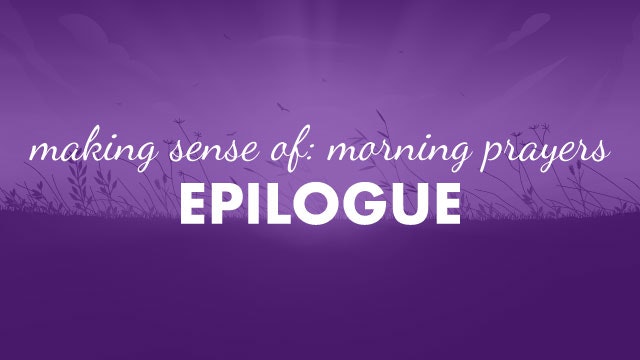
EPILOGUE: Extending the “Six Dawns” Idea to Other Prayers
↳ part 5 of 6 of the series "Making Sense of: Morning Prayers"
In <a href="https://www.alephbeta.org/playlist/shacharit-morning-prayers" target="_blank">Making Sense of: Morning Prayers</a>, Rabbi Fohrman explained the importance of including shema and its blessings in the morning service. He showed how this prayer draws our attention to the inspiring nature of dawn and reminds us of the very first dawn, the dawn of creation. But shema isn’t just said in the morning. It’s included in the evening prayers. It’s said before bed at night. It even shows up in the repetition of the shemoneh esrei. Can Rabbi Fohrman’s insights into why we say shema each morning help us make sense of why we say shema these other times as well? The answer to this question is a resounding: Yes. In this audio epilogue, Rabbi Fohrman extends the connection between shema and creation, first introduced in <a href="https://www.alephbeta.org/playlist/shacharit-morning-prayers" target="_blank">Making Sense of: Morning Prayers</a>, to the evening prayers and kedusha, elucidating some of the profound theological themes of these prayers along the way. The result is a comprehensive understanding of shema that brings meaning to the use of this prayer in any context. This video is based on content that originated from part 2 of a 3 part lecture series on A Tale of God's Two Names. For a more in depth understanding of these materials, be sure to listen to A Tale of Two Names: Elokim and YHVH, A Tale of Two Names: Why Were There Days of Creation? and A Tale of Two Names: From The Garden To The Flood.

Why All These References to Shabbat?
↳ part 7 of 8 of the series "Sefirah, Prayer and Healing from Trauma"
In the last episode, Rabbi Fohrman and Imu discovered a connection between Sefirat HaOmer and the story of the manna. In this episode, they dive deep into the meaning of that connection and what the miracle of the manna can teach us about appreciating our relationship with, and dependence upon, God. But the conversation doesn’t stop there. Once we understand the lesson of the manna, a question still remains: what does this have to do with Sefirat HaOmer, the time on our calendar when we prepare for receiving the Torah on Shavuot? The answer may lie in understanding a further connection between Sefirah, manna and... Shabbat. Listen to find out how this new piece of the puzzle adds an even richer dimension to Sefirat HaOmer, how it helps us prepare for Shavuot, and, ultimately, even connects back to the blessing of Refa’einu.
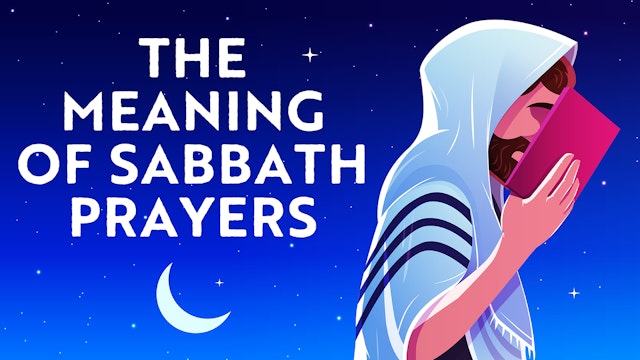
Friday Night: The House That God Built
↳ part 1 of 3 of the series "The Meaning Of Sabbath Prayers"
The Sabbath prayers include special additions for each of the three times of day - Friday night, Saturday morning, and Saturday afternoon. Each prayer includes a rabbinic text that either appears in tandem with a Biblical text about Shabbat, or stands alone to describe the Sabbath. Why did the rabbis choose to include these specific Biblical texts, at these times of the Sabbath? How can we make sense of the liturgical additions that accompany them? In this three part series, Rabbi Fohrman shows how each of these prayers are in fact offering a rabbinic interpretation on the Biblical text, and how each one reveals a deep secret about the nature of Sabbath itself.